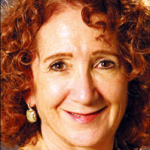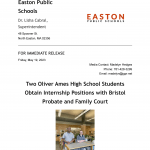 By Alexandra Lapkin, Massachusetts Lawyers Weekly
By Alexandra Lapkin, Massachusetts Lawyers Weekly
For years, Vanda M. Khadem poked around for job opportunities for her daughter, a 20-year-old who’s on the autism spectrum. Khadem considered all sorts of possibilities — even farming — until she had an “epiphany.” “I asked Sarah: ‘Why don’t you help me in my office?’” recalls Khadem, a solo in Brookline. “I had a stack of filing and spent half-an-hour showing Sarah how to do it.
And she nailed it. The stack of filing was 6 inches thick, and she wouldn’t stop until she was done.”
Khadem quickly realized that the job her daughter was excelling in would be a good fit for other young people with autism, many of whom are detail-oriented and meticulous and have a laser focus for repetitive tasks.
So Khadem created the Paralegal Assistant Training Program, or PLAT, as part of Autism Higher Education Foundation — also established by Khadem, to provide people on the autism spectrum with art, music and vocational training through various cultural and educational institutions.
 “There is not a lot of access to continuing education and vocational services [for people with disabilities], and we felt the lack of access is really an issue of civil rights,” says Khadem, who practices special education and family law. “People on the autism spectrum have a lot of interests and gifts that we don’t necessarily see until later on in their lives.”
“There is not a lot of access to continuing education and vocational services [for people with disabilities], and we felt the lack of access is really an issue of civil rights,” says Khadem, who practices special education and family law. “People on the autism spectrum have a lot of interests and gifts that we don’t necessarily see until later on in their lives.”
For greater impact, Khadem opened PLAT to people not only with autism but with different kinds of developmental disabilities. By learning tasks such as copying, filing, data entry and scanning, the hope is that the participants will go on to find gainful employment at law firms. There are currently 15 PLAT participants from various school districts who are interning at Brookline District Court and six Probate & Family Court locations. The participants are accompanied by school counselors who oversee their training.
 Probate Court Chief Justice Angela M. Ordonez calls it a “win-win situation.” While the courts get much needed help with digitizing their backlog of documents, it’s also an opportunity for young people who are willing to learn and need work experience on their resumes, Ordonez says. A regular in Family Court where she knows many of the judges, Khadem decided to approach Ordonez with her courthouse internship proposal. Ordonez says she was on board as soon as she heard the details. “When I learned that Vanda’s own daughter helped her out at her office, it solidified my decision,” she says.
Probate Court Chief Justice Angela M. Ordonez calls it a “win-win situation.” While the courts get much needed help with digitizing their backlog of documents, it’s also an opportunity for young people who are willing to learn and need work experience on their resumes, Ordonez says. A regular in Family Court where she knows many of the judges, Khadem decided to approach Ordonez with her courthouse internship proposal. Ordonez says she was on board as soon as she heard the details. “When I learned that Vanda’s own daughter helped her out at her office, it solidified my decision,” she says.
The problem for many students with autism is that they’re unable to pass the Massachusetts Comprehensive Assessment System test, Khadem explains, forcing them to continue attending school until they age out of the system at 22. At that point, they receive a certificate of attendance instead of a high school diploma, the latter of which is required to attend college. “That bars your ability to continue to learn,” she says. “If you can’t get to college or community college, that becomes a real problem.” Khadem hopes PLAT becomes one solution to the problem, with schools and courts across the state working together to teach people with disabilities the skills they need to be employable, including appropriate office behavior.
 She doesn’t have to sell Hindell S. Grossman on the program. Grossman is already a big believer, having employed an autistic man at her Newton firm, Grossman & Associates, for the last five years. For the most part the worker, Sam, communicates with office staff by email, Grossman says, adding that he comes to work with a job coach who typically supervises him from a distance. In addition to digitizing files, Sam — who’s in his mid-20s — keeps track of the office supply inventory and brings boxes of files to and from storage. “He has become more engaging, he smiles more, he’s a wonderful addition to the staff,” says Grossman, a divorce lawyer. “It humanizes all of us to have him there. Some families that we work with have special needs kids. It’s a good reminder for what we do.”
She doesn’t have to sell Hindell S. Grossman on the program. Grossman is already a big believer, having employed an autistic man at her Newton firm, Grossman & Associates, for the last five years. For the most part the worker, Sam, communicates with office staff by email, Grossman says, adding that he comes to work with a job coach who typically supervises him from a distance. In addition to digitizing files, Sam — who’s in his mid-20s — keeps track of the office supply inventory and brings boxes of files to and from storage. “He has become more engaging, he smiles more, he’s a wonderful addition to the staff,” says Grossman, a divorce lawyer. “It humanizes all of us to have him there. Some families that we work with have special needs kids. It’s a good reminder for what we do.”
— Alexandra Lapkin
The original article was published in Massachusetts Lawyers Weekly on July 7, 2016


